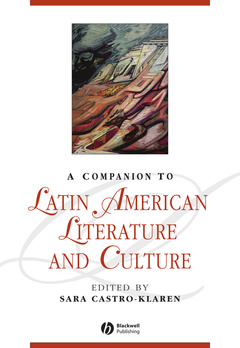Description
A Companion to Latin American Literature and Culture
Blackwell Companions to Literature and Culture Series
Coordinator: Castro-Klaren Sara
Language: English
Publication date: 06-2013
712 p. · 17x24.1 cm · Paperback
Publication date: 04-2008
728 p. · 18x25.4 cm · Hardback
Description
/li>Contents
/li>Biography
/li>
?The work contains a wealth of information that must surely provide the basic material for a number of study modules. It should find a place on the library shelves of all institutions where Latin American studies form part of the curriculum.?
Reference Review
?In short, this is a fascinating panoply that goes from a reevaluation of pre-Columbian America to an intriguing consideration of recent developments in the debate on the modem and postmodern. Summing Up: Recommended.?
CHOICE
A Companion to Latin American Literature and Culture reflects the changes that have taken place in cultural theory and literary criticism since the latter part of the twentieth century.
Written by more than thirty experts in cultural theory, literary history, and literary criticism, this authoritative and up-to-date reference places major authors in the complex cultural and historical contexts that have compelled their distinctive fiction, essays, and poetry. This allows the reader to more accurately interpret the esteemed but demanding literature of authors such as Jorge Luis Borges, Mario Vargas Llosa, Octavio Paz, and Diamela Eltit. Key authors whose work has defined a period, or defied borders, as in the cases of Sor Juana Inés de la Cruz, César Vallejo, and Gabriel García Márquez, are also discussed in historical and theoretical context. Additional essays engage the reader with in-depth discussions of forms and genres, and discussions of architecture, music, and film
This text provides the historical background to help the reader understand the people and culture that have defined Latin American literature and its reception. Each chapter also includes short selected bibliographic guides and recommendations for further reading.
Notes on Contributors xi
Editor's Acknowledgments xx
Acknowledgments to Sources xxi
Introduction 1
Sara Castro-Klaren
Preamble: The Historical Foundation of Modernity/Coloniality and the Emergence of Decolonial Thinking 12
Walter D. Mignolo
Part I Coloniality 33
1 Mapping the Pre-Columbian Americas: Indigenous Peoples of the Americas and Western Knowledge 35
Gustavo Verdesio
2 Writing Violence 49
José Rabasa
3 The Popol Wuj: The Repositioning and Survival of Mayan Culture 68
Carlos M. López
4 The Colegio Imperial de Santa Cruz de Tlatelolco and Its Aftermath: Nahua Intellectuals and the Spiritual Conquest of Mexico 86
Rocío Cortés
5 Memory and "Writing" in the Andes 106
Sara Castro-Klaren
6 Writing the Andes 117
Sara Castro-Klaren
7 Court Culture, Ritual, Satire, and Music in Colonial Brazil and Spanish America 137
Lúcia Helena Costigan
8 Violence in the Land of the Muisca: Juan Rodríguez Freile's El carnero 146
Álvaro Félix Bolaños
9 The Splendor of Baroque Visual Arts 161
Lisa DeLeonardis
10 History of a Phantom 182
Francisco A. Ortega
11 Colonial Religiosity: Nuns, Heretics, and Witches 197
Kathryn Joy McKnight
Part II Transformations 211
12 The Tupac Amaru Rebellion: Anticolonialism and Protonationalism in Late Colonial Peru 213
Peter Elmore
13 The Caribbean in the Age of Enlightenment, 1788–1848 228
Franklin W. Knight
14 The Philosopher-Traveler: The Secularization of Knowledge in Spanish America and Brazil 247
Leila Gómez
15 The Haitian Revolution 262
Sibylle Fischer
Part III The Emergence of National Communities in New Imperial Coordinates 277
16 The Gaucho and the Gauchesca 279
Abril Trigo
17 Andrés Bello, Domingo Faustino Sarmiento, Manuel González Prada, and Teresa de la Parra: Four Writers and Four Concepts of Nationhood 293
Nicolas Shumway
18 Reading National Subjects 309
Juan Poblete
19 For Love and Money: Of Potboilers and Precautions 333
Doris Sommer
Part IV Uncertain Modernities 349
20 Shifting Hegemonies: The Cultural Politics of Empire 351
Fernando Degiovanni
21 Machado de Assis: The Meaning of Sardonic 369
Todd S. Garth
22 The Mexican Revolution and the Plastic Arts 379
Horacio Legras
23 Anthropology, Pedagogy, and the Various Modulations of Indigenismo: Amauta, Tamayo, Arguedas, Sabogal, Bonfi l Batalla 397
Javier Sanjinés C.
24 Cultural Theory and the Avant-Gardes: Mariátegui, Mário de Andrade, Oswald de Andrade, Pagú, Tarsila do Amaral, César Vallejo 410
Fernando J. Rosenberg
25 Latin American Poetry 426
Stephen M. Hart
26 Literature between the Wars: Macedonio Fernández, Jorge Luis Borges, and Felisberto Hernández 442
Adriana J. Bergero, translated by Todd S. Garth
27 Narratives and Deep Histories: Freyre, Arguedas, Roa Bastos, Rulfo 461
Adriana Michèle Campos Johnson
28 The "Boom" of Spanish-American Fiction and the 1960s Revolutions (1958–75) 478
Gerald Martin
29 João Guimarães Rosa, Antônio Callado, Clarice Lispector, and the Brazilian Difference 495
Elizabeth A. Marchant
30 Feminist Insurrections: From Queiroz and Castellanos to Morejón, Poniatowska, Valenzuela, and Eltit 509
Adriana J. Bergero and Elizabeth A. Marchant
31 Caribbean Philosophy 531
Edouard Glissant
Part V Global and Local Perspectives 551
32 Uncertain Modernities: Amerindian Epistemologies and the Reorienting of Culture 553
Elizabeth Monasterios P.
33 Testimonio, Subalternity, and Narrative Authority 571
John Beverley
34 Affectivity beyond "Bare Life": On the Non-Tragic Return of Violence in Latin American Film 584
Hermann Herlinghaus
35 Postmodern Theory and Cultural Criticism in Spanish America and Brazil 602
Ileana Rodríguez
36 Post-Utopian Imaginaries: Narrating Uncertainty 620
Silvia G. Kurlat Ares
37 Cultural Modalities and Cross-Cultural Connections: Rock across Class and Ethnic Identities 636
Gustavo Verdesio
38 Film, Indigenous Video, and the Lettered City's Visual Economy 647
Freya Schiwy
Index 665
Sara Castro-Klaren is Professor of Latin American Culture and Literature at Johns Hopkins University. She has been the recipient of several teaching awards. Most recently the Foreign Service Institute conferred upon her the title of “Distinguished Visiting Lecturer” (1993). She was appointed to the Fulbright Board of Directors by President Clinton in 1999. Her publications include El mundo mágico de José María Arguedas (1973), Understanding Mario Vargas Llosa (1990) and Escritura, transgresión y sujeto en la literatura latinoamericana (1989), Latin American Women Writers (1991) edited with Sylvia Molloy and Beatriz Sarlo and The Narrow Pass of Our Nerves: Writing Coloniality and Postcolonial Theory (2011).




